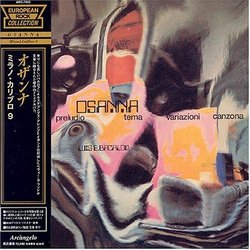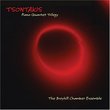| All Artists: Osanna Title: Milano Calibro Members Wishing: 2 Total Copies: 0 Label: Disk Union Original Release Date: 1/1/2004 Re-Release Date: 6/7/2004 Album Type: Import, Original recording remastered Genres: International Music, Rock Styles: Progressive, Progressive Rock Number of Discs: 1 SwapaCD Credits: 1 UPC: 4988044370609 |
Search - Osanna :: Milano Calibro
 | Osanna Milano Calibro Genres: International Music, Rock
Japanese remastered reissue of the Italian progressive rock act's 1972 album, packaged in a miniature LP sleeve. Arcangelo. 2004. |
Larger Image |
CD DetailsSynopsis
Album Description Japanese remastered reissue of the Italian progressive rock act's 1972 album, packaged in a miniature LP sleeve. Arcangelo. 2004. Similar CDs
|
CD ReviewsGreat Italian prog, but warning: not exactly the film soundt BENJAMIN MILER | Veneta, Oregon | 06/21/2004 (4 out of 5 stars) "Osanna followed L'Uomo with Milano Calibro 9 in 1972. This time around, it's a soundtrack to an Italian crime film, at least I thought it was a soundtrack. I have finally got to see the film, and it turned out this album wasn't exactly used for the film, but rather variants, but never exactly the same as on the album. I start wondering if there were legal difficulties from using the exact music on the album as on the film? The album is also called Preludio, Tema, Variazioni, Canzona, which is less deceptive, although in 1973 the album received an American release on the Peters International label and clearly says "Milano Calibro 9" on the cover. I still recognize many of the themes on the album used on the film, but it isn't the same as on the album. Still Osanna and Luis Enriquez Bacalov did provide the music for the film. Plus there is one scene in the film where I hear Osanna, but it's a song not featured on any of their albums (it's the scene where Barbara Bouchet is dancing on the table), and it sounds like it wouldn't be out of place on L'Uomo. Then there's another scene where I hear something off New Trolls' Concerto Grosso per 1, which I can't be too surprised, because that was the band Bacalov was involved in before he involved himself with Osanna.
The whole album is basically a collection of short pieces showing off the talents of the band. Orchestra is provided by Luis Enriquez Bacalov (who was born in Argentina), the same guy responsible for New Trolls Concerto Grosso Per 1 (and their 1976 sequel, Concerto Grosso Nr. 2) and RDM's Contaminazione (and its English-language counterpart, Contamination). So like those albums mentioned, this is another excellent combination of classical orchestra with '70s prog, in this case, a Jethro Tull, King Crimson, VdGG influenced type of prog. Dominated by loud saxes, flutes (Jethro Tull-like), synthesizers (the ARP 2600), aggressive guitars, and drums. "Preludio" starts off with piano, then the orchestra kicks in, before the band gets in to an aggressive jam. "Tema" is a nice, laid-back clasically-influenced piece, dominated by piano and ARP 2600. Then you have "Variazioni" which are divided in to several parts. The first part consists of aggressive jams, dominated by Elio D'Anni's saxes (he played two saxes at once, like VdGG's David Jackson or Colosseum's Dick Heckstall-Smith), before mellowing out with some more mystical passages dominated by quite electric guitar and vibes. This part most points to their following album, Palepoli. Then the vocals kick in, which are in English, which shows the band's weak point and that is not singing in their native language. Luckily vocals are almost completely absent on this album. The rest of the album consists mainly of very short pieces that show the trademark Osanna sound, although you wished they were longer in order to really let the band soar (luckily that problem was solved with Palepoli). The final piece, "Canzona" is also called "There Will Be Time", the only other vocal cut on this album. This isn't particularly progressive, it's simply a pop number, and really out of place on the album. Regardless, this is still a worthwhile album for the Italian prog collector. The only real reason for the four stars is Palepoli is even better, in my opinion, and the English language vocals, I'm afraid, was never the band's strong points (just like PFM) (they solved that problem with Palepoli by being all in Italian)." |

 Track Listings (10) - Disc #1
Track Listings (10) - Disc #1


